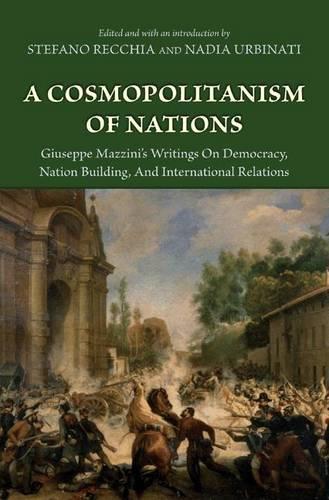
A Cosmopolitanism of Nations: Giuseppe Mazzini's Writings on Democracy, Nation Building, and International Relations
(Hardback)
Publishing Details
A Cosmopolitanism of Nations: Giuseppe Mazzini's Writings on Democracy, Nation Building, and International Relations
By (Author) Giuseppe Mazzini
Edited by Stefano Recchia
Edited by Nadia Urbinati
Princeton University Press
Princeton University Press
16th November 2009
United States
Classifications
Tertiary Education
Non Fiction
Political structures / systems: democracy
International relations
320.01
Physical Properties
Hardback
264
Width 152mm, Height 235mm
539g
Description
This anthology gathers Giuseppe Mazzini's most important essays on democracy, nation building, and international relations, including some that have never before been translated into English. These neglected writings remind us why Mazzini was one of the most influential political thinkers of the nineteenth century--and why there is still great benefit to be derived from a careful analysis of what he had to say. Mazzini (1805-1872) is best known today as the inspirational leader of the Italian Risorgimento. But, as this book demonstrates, he also made a vital contribution to the development of modern democratic and liberal internationalist thought. In fact, Stefano Recchia and Nadia Urbinati make the case that Mazzini ought to be recognized as the founding figure of what has come to be known as liberal Wilsonianism. The writings collected here show how Mazzini developed a sophisticated theory of democratic nation building--one that illustrates why democracy cannot be successfully imposed through military intervention from the outside. He also speculated, much more explicitly than Immanuel Kant, about how popular participation and self-rule within independent nation-states might result in lasting peace among democracies. In short, Mazzini believed that universal aspirations toward human freedom, equality, and international peace could best be realized through independent nation-states with homegrown democratic institutions. He thus envisioned what one might today call a genuine cosmopolitanism of nations.
Reviews
"[A]n inspiring contribution to the current debates on global justice, humanitarian intervention, and secession."--Daniel Voelsen, Ethics & International Affairs
Author Bio
Stefano Recchia is a PhD candidate in political science at Columbia University. Nadia Urbinati is the Nell and Herbert M. Singer Professor of Contemporary Civilization and Professor of Political Theory at Columbia.
